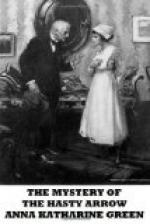“Elvira is out—gone to some church meeting or social gathering down in the village. She will be back. But I won’t wait. I will try and get in in the old way. The storm may delay her indefinitely.”
Leaving the door, which was raised only two steps above the road, she walked to the corner of the house and stooping down, felt behind a projecting stone for what she had certainly expected to find there—a key to the front door.
But her hand came away empty.
Surprised, for this was not her first visit to this house (she had once spent weeks there and knew the habits of its mistress well), she felt again in the place where the key should be, and where she had so often found it when her friend was out. But all to no avail. It was not there, and presently she was in the road again staring at the closed-up front.
As she did so, these words left her lips:
“And she knew I might come at any minute!”
Tottering from fatigue, she caught at the trunk of a great tree which held roof and wall in its embrace.
Why did it quiver? Why did the ground beneath her feet seem to rock and all nature darken as with the falling of a pall. The storm was upon her. It had rolled up with incredible swiftness and was about to break over her head. With a shock she realized her position. No shelter, and the storm of the season upon her! What should she do? There was no way of getting into the house at the rear, for the bushes were too thick. She must accept her fate, be drenched to the skin, perhaps smitten by the next thunderbolt. But Antoinette Duclos was no coward, so far as physical ills were concerned. She drew herself up straight against the trunk of the tree, thinking that this, bad as it was, was better than shelter with the enemy at the door. She would be calm, and she was fast growing so when she suddenly became aware of a man standing very near and hunting her out through the dusk.
She never knew why the scream which rose in her throat did not pass her lips. Her terror was unspeakable, for she had heard no advance; indeed, there was too much noise about her for that. But it was the silent terror of despair, for she thought it was the man from whom she had made this great effort at escape. But he soon proved to her he was not. It was just the driver of the stagecoach, returned to see what had become of her. He had feared to find her stricken down in the road, and when he saw her clinging alone and in a maddened way to this tree, he made no bones of speaking to her with all necessary plainness.
“I asked you if it was Missus Brown you had come to see,” he called to her through the din. “And you wouldn’t answer.”
“Why should I?” she shouted back. “Why do you speak like that? Has anything happened to her?”
“Don’t you know?”
“No, no—she was well when I heard from her last, and expecting me, or so she wrote. Is she—she—”




